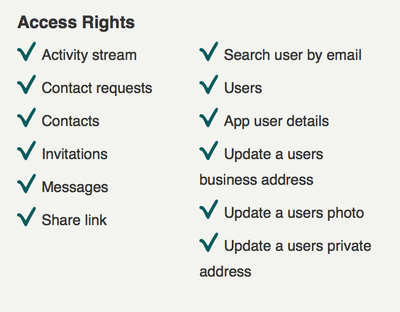AppSuite:Xing
Contents
Using Xing with OX App Suite
This page describes how to get a API-key needed for the XING integration features available starting with App Suite version 7.6.
Preparation
- go to https://dev.xing.com/login
- log in with a valid xing account. (Please note that upon entering production status the app and the personal account used to create it will be decoupled. So there is no need to use a company account here.)
- click "+ Create App" in the upper right
- enter reasonable app and developer details (especially the postal address is important because the 2nd half of the API-key will be sent there)
- select "web" as "Type of app"
- the app information (including logo) is what will be shown to the enduser when he decides whether to allow the app access to his xing-data
- set the domain of your App Suite server as "Callback domain" (e.g. "https://beta.ox.io/")
- enter this text for "Description (English)":
Use this connector to synchronize your XING contacts with Open-Xchange App Suite, see the public XING-profile of people sending you email, synchronize your personal information with your XING-profile, see and write XING messages and connect via XING to your contacts from within Open-Xchange App Suite. For this we humbly require the access rights to your profile and connection information you see above.
The XING activity stream will be shown in a widget of the OX App Suite portal.
You will be able to post updates from the OX App Suite portal that contain links.
The personal data of your XING-profile can be updated with your data in the OX App Suite addressbook with the press of one button whenever you want.
- select access rights so they match those in this screenshot
- enter the first PIN (sent via email to the address given under "Company Profile" -> "Email address"). Check your spam folder if you do not get this immediately, more often than not it is recognized as spam.
- enter the second PIN (sent via _regular_ mail to the postal address given under "Company Profile". Please note that this may take up to a week.)
- you will see 2 API-keys: "Consumer key" and "Consumer secret".
Configure Server Files
- Enter the API-keys in /opt/open-xchange/etc/xingoauth.properties (properties "com.openexchange.oauth.xing.consumerKey" and "com.openexchange.oauth.xing.consumerSecret")
Install on OX App Suite
Debian GNU/Linux 10.0
Add the following entry to /etc/apt/sources.list.d/open-xchange.list if not already present:
deb https://software.open-xchange.com/products/appsuite/stable/backend/DebianBuster/ /
# if you have a valid maintenance subscription, please uncomment the
# following and add the ldb account data to the url so that the most recent
# packages get installed
# deb https://[CUSTOMERID:PASSWORD]@software.open-xchange.com/products/appsuite/stable/backend/updates/DebianBuster/ /
and run
$ apt-get update $ apt-get install open-xchange-oauth open-xchange-messaging
Debian GNU/Linux 11.0
Add the following entry to /etc/apt/sources.list.d/open-xchange.list if not already present:
deb https://software.open-xchange.com/products/appsuite/stable/backend/DebianBullseye/ /
# if you have a valid maintenance subscription, please uncomment the
# following and add the ldb account data to the url so that the most recent
# packages get installed
# deb https://[CUSTOMERID:PASSWORD]@software.open-xchange.com/products/appsuite/stable/backend/updates/DebianBullseye/ /
and run
$ apt-get update $ apt-get install open-xchange-oauth open-xchange-messaging
This page was last checked on 2014/06/26.
Person responsible: Karsten Will (creates new pre-filled email)
